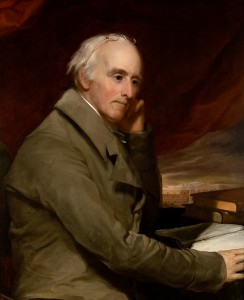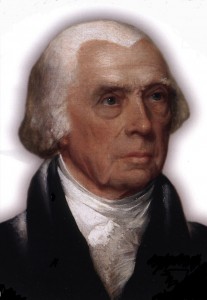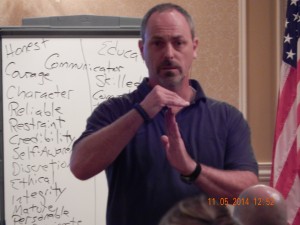“Besides the advantage of being armed, which the Americans possess over the people of almost every other nation, the existence of subordinate governments, to which the people are attached and by which the militia officers are appointed, forms a barrier against the enterprises of ambition, more insurmountable than any which a simple government of any form can admit of.”
James Madison, Federalist No. 46, 1788
The true intent of the Second Amendment: A Primer on the Second Amendment
The elevation at the Dead Sea is 1300 feet BELOW sea level making it the lowest spot on the face of the planet. Consequently, it’s average atmospheric pressure is the highest anywhere on Earth. I took advantage of our visit to the Dead Sea to not only clean some of the desert grime off of me, but also to talk about the unique pressures that face police professionals and their families.
What is it that makes law enforcement one of the most stressful of all professions? The average citizen might say it is the long and crazy work hours. Or maybe the long periods of boredom punctuated by moments of extreme terror! Or maybe it has to do with seeing people at their worst and dealing with the underbelly of society. Or it could be the trauma that they witness on a regular basis.
All of these factors contribute to the stress load. But as stressful as law enforcement is, it is interesting that most police professionals will say that the most stressful part of their job is not what you would expect. Typically, they will say it is internal relationships! In other words, this job is stressful enough. But what’s REALLY stressing me out is all these crazy people I have to work with…!
The character-based principles of Police Dynamics are all about building trust-based relationships both internally and externally. So strengthening internal relationships not only makes a law enforcement agency incredibly more effective in accomplishing the police mission. It has the added benefit of reducing the stress load that each officer bears on a daily basis.
Here’s some footage taken by our driver of my videographer, Gary Curry, and me floating in the Dead Sea. If you have never done it, it is an incredible experience…
If you liked this message, please share it with others by clicking on the
“Share the Knowledge” buttons below…
I battled a sandstorm and some ornery camels to film this video about Sir Robert Peel while camping in the desert of Wadi Rum. After you watch the video, scroll down for some out-takes…
Sir Robert Peel was a Prime Minister of England and served as the Home Secretary during the 1820s. In England, the Home Secretary is somewhat like our Attorney General in the US. And while he was Home Secretary, Sir Robert Peel founded the London Metropolitan Police, perhaps the first professionally trained, non-military police force in history. He founded them on nine basic principles, often called Peel’s Principles or Peelian principles. To this day we still call policemen in England “Bobbies” in honor of Sir Bobby Peel. His principles are still amazingly relevant to our practice of policing today. One of them says this:
Police, at all times, should maintain a relationship with the public that gives reality to the historic tradition that the police are the public and the public are the police; the police being only members of the public who are paid to give full-time attention to duties which are incumbent upon every citizen in the interests of community welfare and existence.
He didn’t use the term, but Peel is describing Coactive Policing.
If you want to see some out-takes including my attempt to film this segment in the middle of a sandstorm and me getting thrown off of my camel as soon as we finished filming, watch below…
If you liked this message, please share it with others by clicking on the
“Share the Knowledge” buttons below…
 “The American war is over; but this far from being the case with the American revolution. On the contrary, nothing but the first act of the drama is closed. It remains yet to establish and perfect our new forms of government, and to prepare the principles, morals, and manners of our citizens for these forms of government after they are established and brought to perfection.”
“The American war is over; but this far from being the case with the American revolution. On the contrary, nothing but the first act of the drama is closed. It remains yet to establish and perfect our new forms of government, and to prepare the principles, morals, and manners of our citizens for these forms of government after they are established and brought to perfection.”
— Benjamin Rush, letter to Price, 1786
A jeep tour in Wadi Rum was a great opportunity to illustrate the principle of Coactive Policing.
Coactivity can be compared to driving a four-wheel drive vehicle. Think of your community as the vehicle. If all the components (wheels) are pulling together in the same direction, your community can overcome obstacles and go a long way toward accomplishing its goals.
If you liked this message, please share it with others by clicking on the “Share the Knowledge” buttons below… (more…)
I hope you are enjoying this series of Police Dynamics teachings from the Holy Land. I am working on some new training resources behind the scenes so I haven’t been producing any new videos for a while. Hopefully, these resources will be available to you soon.
The first video, “The Path of MOST Resistance” was recorded at the Siq (narrow passage) leading down to the ancient city of Petra in the nation of Jordan. As rushing water followed the “path of least resistance,” it carved the Siq from the limestone substrate. Barney Barnes, my Chief of Staff when I was Sheriff (every sheriff needs a Barney, and I NEVER get tired of that joke…) often said, “Following the path of least resistance makes rivers, and men, crooked…”
BTW: Barney has written an excellent book called Born to Be a Warrior that you might want to check out…
“The Mark of Character” was filmed in front of the Treasury at Petra, made famous in “Indiana Jones and the Temple of Doom” which was filmed there. In it, I talk about the meaning of character and living your life “within the dash” which will be engraved on your tombstone.
If you liked this message, please share it with others by clicking on the “Share the Knowledge” buttons below…
Shobak Castle was the first fortress built by the Crusaders in the nation of Jordan. My friend, Gary Curry, and I visited this site and used it as an opportunity to talk about how to “CRASH” criminal strongholds.
In the early 12th century, the Crusaders used Shobak as their base of operations to exercise influence over the surrounding area. In the same way, criminals will establish strongholds and use them as base for “invading” surrounding communities, effectively expanding their influence (not to suggest Crusaders were criminals, but you get the point). It’s akin to playing chess on a giant chessboard. As the criminals gain ground, they expand their influence. (more…)
Qumran caves on the Israel side of the Dead Sea provided an interesting backdrop for this video about reclaiming criminal strongholds.
Known as our CRASH program (Community Response Against StrongHolds), this 6-step Battle Plan was the strategy we used to successfully CRASH criminal stongholds in Dorchester County. Utilizing a potent combination of community policing and coactive policing principles, the program allowed us to build the trust-based relationships needed to restore order in the communities. (more…)
Here is a brief video clip showing a spectacular view of the Capernaum synagogue where I filmed the Centurion video. According to Luke chapter 7, the Centurion built this synagogue for the local Jewish community who greatly revered him. He is a great historical example of a man under authority who was respected by the community he served…
The full video can be viewed at: http://www.youtube.com/watch?v=iPQI6Yupt48
I never tire of telling the story of the Centurion chronicled in Matthew Chapter 8. It remains one of the highlights of the Police Dynamics program because it so clearly illustrates the principle of a law enforcement or government official operating “under authority.”
This video from the Police Dynamics archives was actually filmed in the very synagogue that was built by the Centurion in the village of Capernaum, Israel! I had to speak in hushed tones because there were a number of tour groups there at the same time. Apparently yellow ballcaps were in fashion that day!
About 2000 years ago, the land of Palestine was under the rule of the Roman Empire, a very powerful and at times corrupt governing authority. Within a town or village, the Roman government would appoint a representative. He was known as the Centurion. The Centurion was an army commander and served as the representative of Roman governmental authority and power. He functioned much like a Police Chief, Fire Chief, Public Safety Director, Mayor, and Magistrate all rolled into one! Although the Romans did not appreciate separation of powers quite like we do, he was clearly responsible for maintaining the law, order, health, safety, and morals of that village. (more…)


